Humanities & Social Sciences
Prof. Eddy Walakira hands over SWASA Headship to Dr. Denis Muhangi
Published
3 years agoon
By
Jane Anyango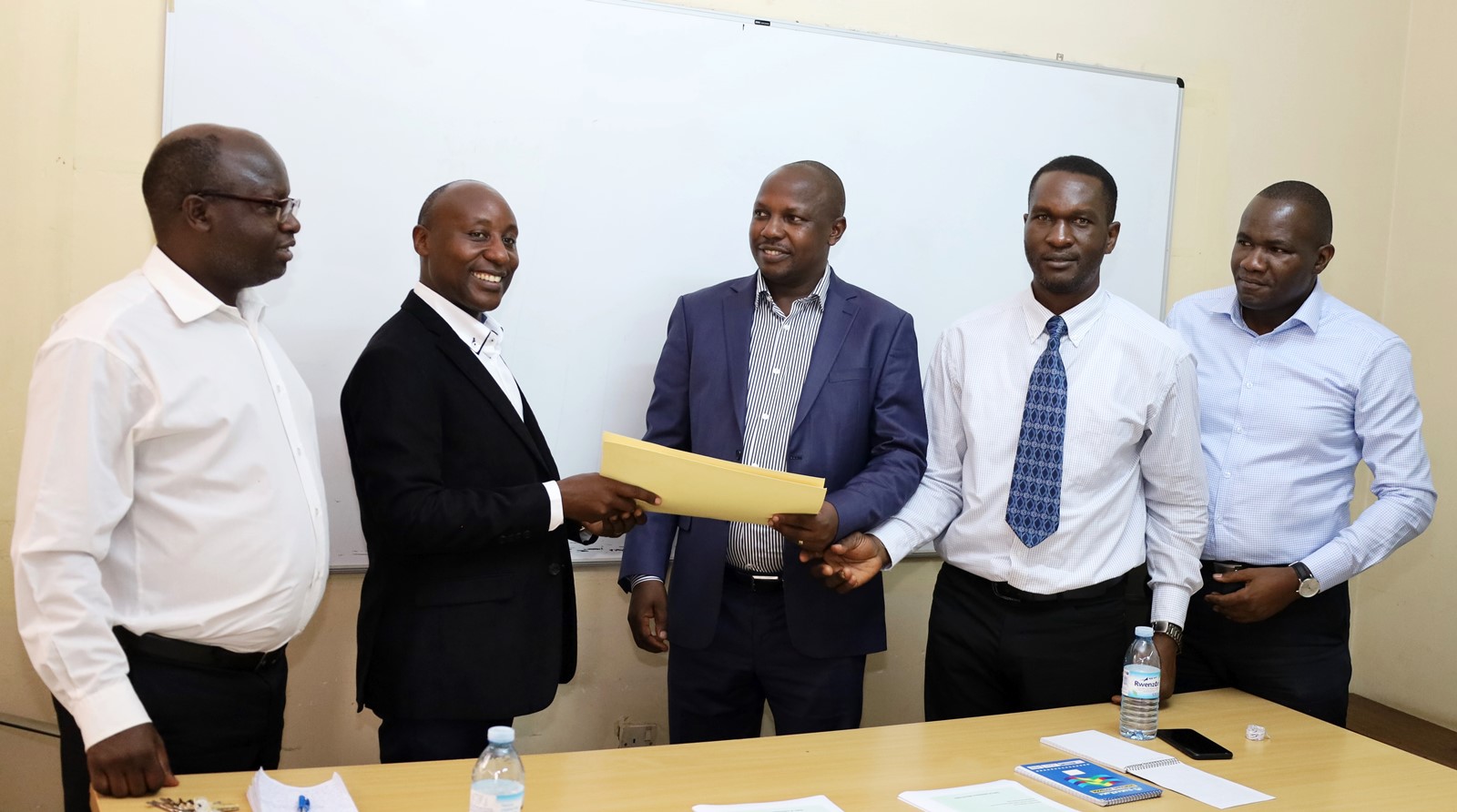
Professor Eddy Walakira on 11th May, 2023 handed over office to Dr. Denis Muhangi as new head, Department of Social Work and Social Administration.
Prof. Walakira started working at Makerere University in 1996 and was ushered into leadership when he was first appointed in Acting Head on 1st November 2012 and subsequently, became substantive on 1st September 2014.
“So that marks over 10 years in leadership of the department and I am grateful for all the time that I have been able to serve” He said.
Reflecting over his leadership style, Prof. Walakira reported that he has emphasized team work, had cohesion, peaceful co-existence and discounted negative talk.
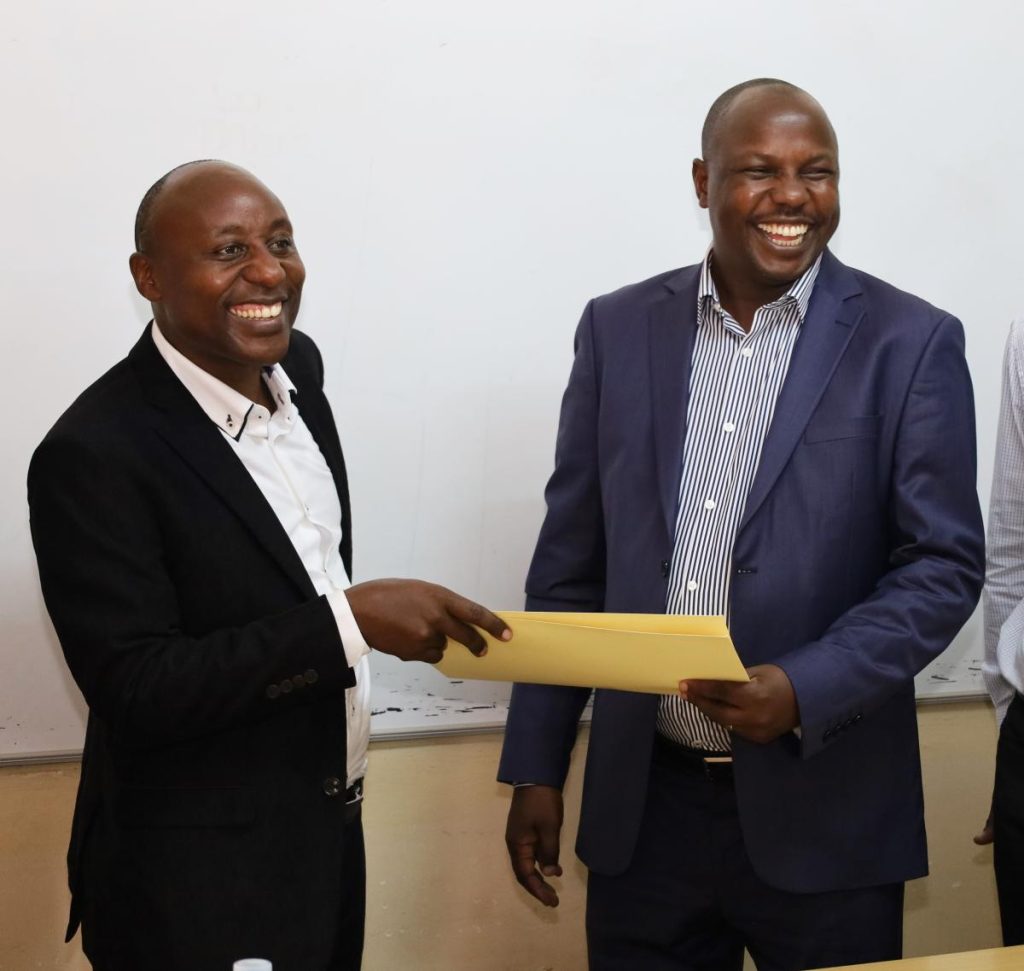
“We have given every person, freedom to express themselves and because of that, the atmosphere that we have created even in project collaborations and coordination, I have made sure that everyone participates. I have encouraged staff not to look at what individuals do but instead learn from their capabilities and creatively innovate something that they can do themselves”, He said.
That style he said, avoided conflicts and ensured staff stand as a coherent strong team and built a unit that was resourceful.
The department he stressed has not been in a fragile financial situation and has been able to meet costs for big meetings and visiting delegations.
“As a leader, when you get into office, it would be very difficult to start looking at the university to meet all the financial needs of the unit. All along, I have created an environment of flexibility, collegiality, teamwork and being pragmatic so as to take advantage of every opportunity that comes along so that we are able to support university functions and activities”, he explained.
Across all the years, Prof. Walakira said the department has been able to support the part timers who are not paid by the university.
Prof. Walakira highlighted key achievements under his tenure in areas of staffing capacity, teaching and training, developing new programmes, curriculum revision, staff promotion, research, publications and collaborations, infrastructure and facilities, financial resources and supplies, ongoing transformation efforts and maintaining visibility.
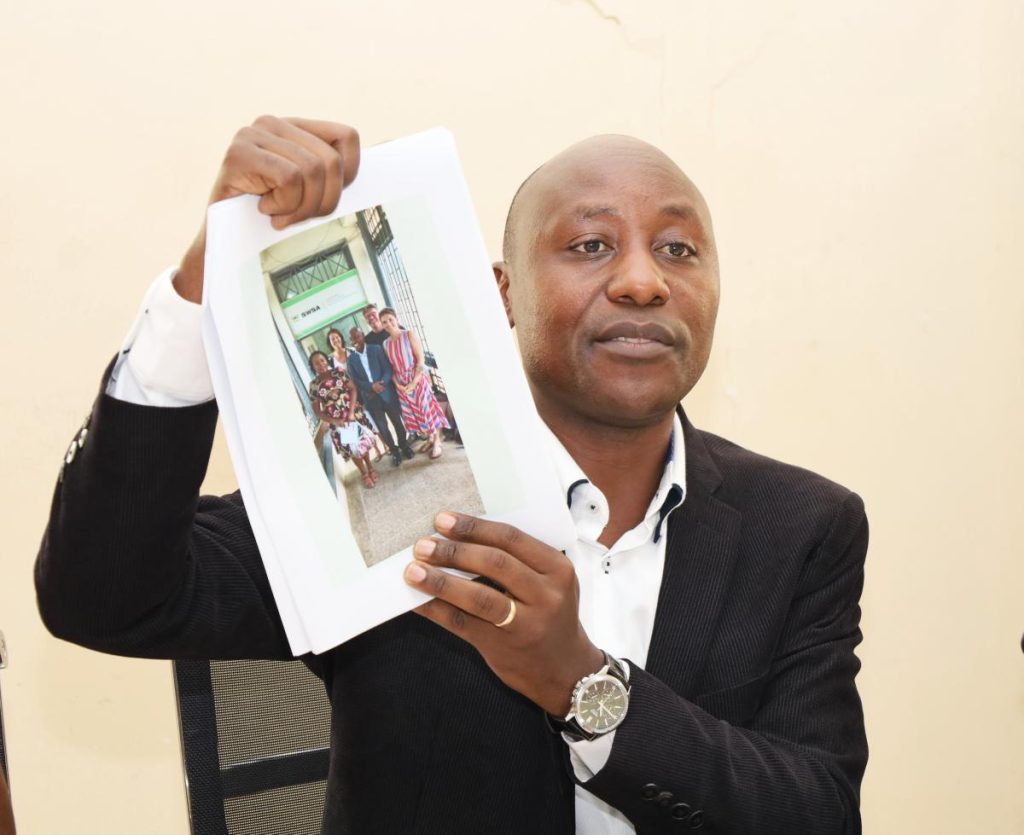
He said for the last couple of months, the units has been thinking about the way forward and came to appoint that the department should transform into a school imploring the incoming head to look into what members of staff subscribe to, to move the process forward.
He said the paper work is about to be completed to achieve a higher goal calling for the necessary support to achieve this.
“This s important because it elevates the profession itself, because the higher you go as a unit the more the profession gets the clout to negotiate, be considered important and also to pursue an agenda that truly reflects an agenda that you aspire to as a profession”, Prof. Walakira stressed.
Other remarkable achievements according to Prof. Walakira include improvement in staffing capacity standing at 54% as one of the university units with staffing capacity beyond 50% . By the time he assumed office, the unit had 24 staff, of these 19 teaching and 5 support staff. In terms of qualifications, 63 % of staff had PhDs when he came in but currently 69% hold PhDs.
In teaching and learning Prof. Walakira reported that the department has a Bachelor of Social Works and Co teach Bachelor of social sciences with 4 Masters programmes (with two active namely Master of social Works and Master of social sector planning and management) and a PhD based on research.
Areas that need strengthening in teaching according the Prof. Walakira include teaching in sign language which is depended on part timers, managing complex disabilities and promoting inclusion, teaching quantitative research at all levels, teaching social work and mental health, and the need for staffing in social policy , climate change adaptation and mitigation.
He reported that during his administration, the unit successfully revised the curriculum for the active programs, and was currently revising the curriculum for the master of social sector planning and management and developing a new curriculum for a PhD in social work with an additional description in social work.
Prof. Walakira also reported that the department developed a document detailing the minimum standards and competence framework for social work education and training in the country to amplify the relevance of the subject to nation building.
From one Professor and Associate Professor, he said the unit has 6 members at the level of Assoc. Professor with 5 senior lectures from 4 that time with a number of staff who have applied for promotion. The department he reported was outstanding in the area research, collaborations and publications with over 70% of staff actively involved in research and publications.
I accept the responsibility – Incoming Head Dr. Denis Muhangi
The incoming Head, Dr. Denis Muhangi thanked the outgoing head for the leadership offered, the innovativeness and pragmatism which are necessary for any any leader to thrive amidist limited resources and challenges.
“It is my great pleasure this morning to accept the responsibility being bestowed upon me, I have shaken hands with the outgoing head, received the files and I accept the responsibility. I thank all members for making time to witness the hand over and for the confidence and trust you put in me when you elected me”, Dr. Muhangi appreciated
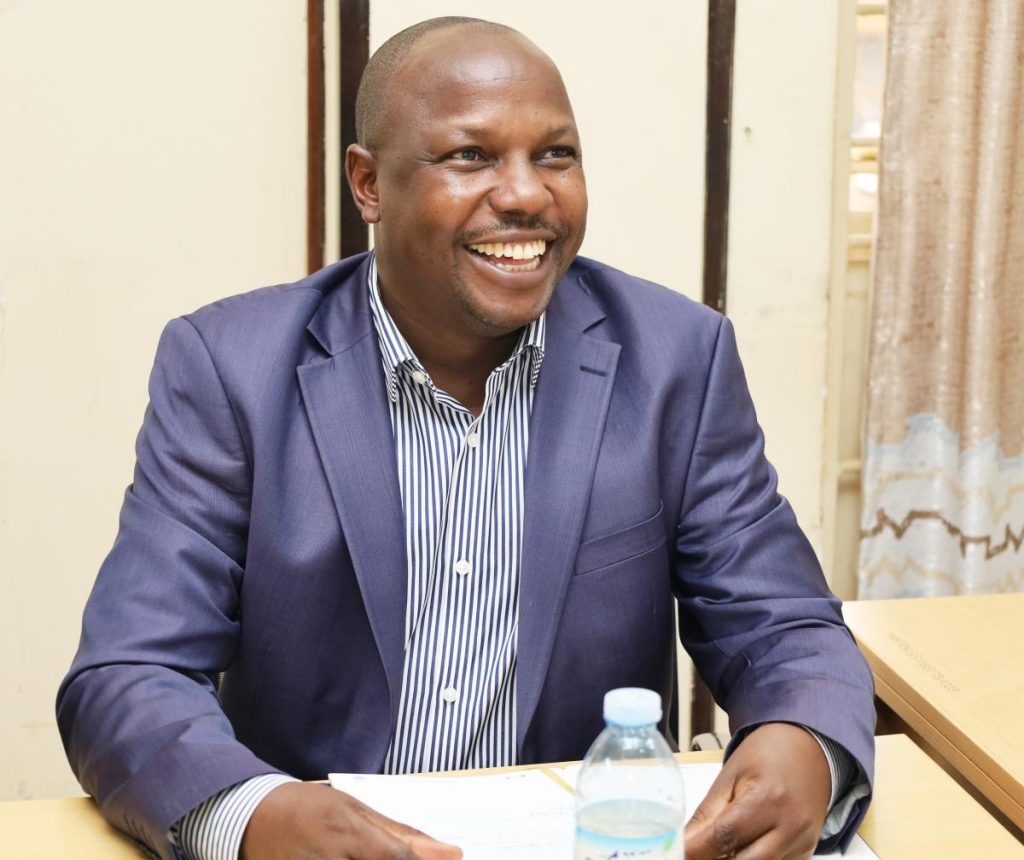
Dr. Muhangi described the transition as an important milestone in the history of the department pledging to carry on the mantle by leveraging on his predecessor’s’ mode of leadership of collegiality, peaceful conflict resolution and harmonious co-existence.
“We are social workers, we teach, conflict resolution, dialogue and issues of engagement so, we should practice what we teach to help maintain a good environment for us to prosper”
As he embarks on this journey, Dr. Muhangi said the tasks ahead were clear urging staff to continue with roles of teaching, examining and supervision saying, this was the main reason they exist in the university.
He implored staff to tap into existing opportunities and leverage on existing networks nationally and internally and to enhance the brand and the visibility of the department for better recognition.
He recognized the resourcefulness of every staff hoping to draw on these resources for collective achievements.
He expressed the need for all to come up with innovative ways of supporting graduate students to complete on time and issues pointed out by the outgoing head.
“I appreciate that what I am taking on is a huge responsibility and I want to pledge that I will do my part to provide support, guidance and enabling environment as will be need. It is also comforting to know that there is the support of the Dean, the Principal’ office and other support units of the university and management”, Dr. Muhangi promised.
He called on staff to continue cherishing the spirit of social support in good and bad times.
The Dean commends efforts to preserve the profession
Presiding over the ceremony. the Dean School of Social Sciences, Dr. Justus Twesiggye said this was historical in the making for the department to have an elected head after having a record acting heads who are finally confirmed
Noting that there is struggle to find a professional and social activism that promotes social change, Dr. Twesigye expressed the need for new recruits to be part of this culture and learn that it is professionalization in social work that one can hand over, talk and welcome change.
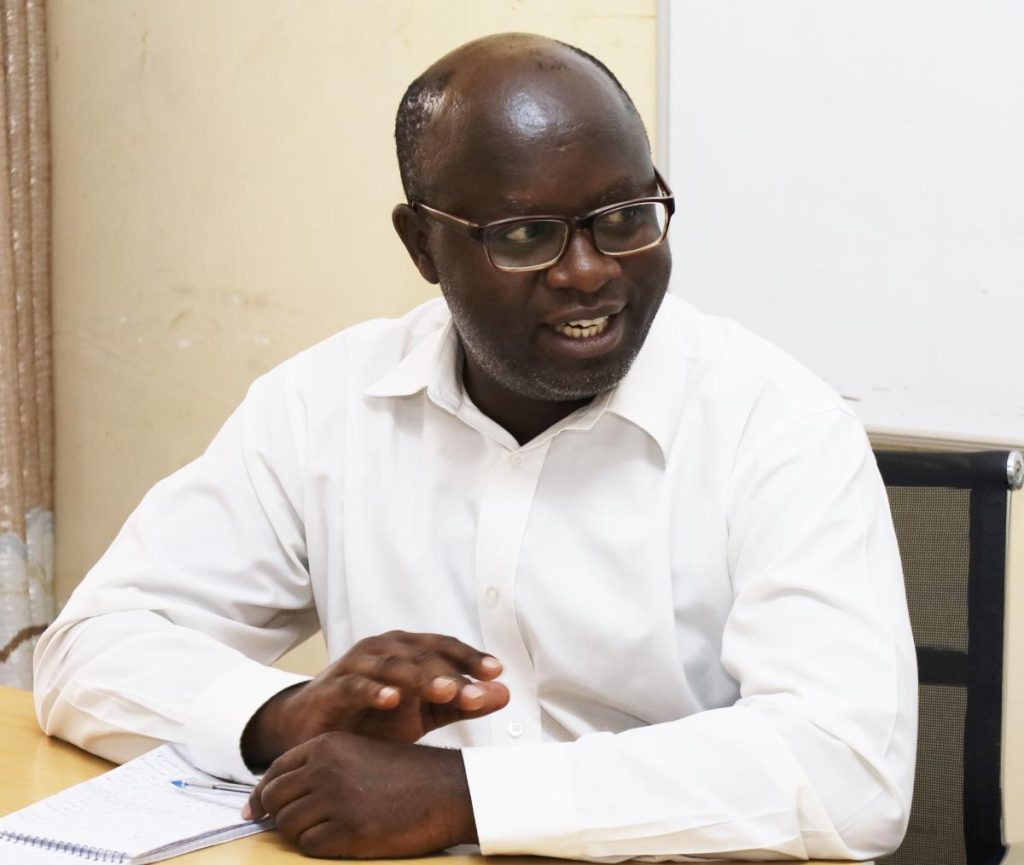
“In social development terms, we are happy that now we can make choice that we have more capacity, there is agency and that we can hand over and talk of change without fights. To me this is something we should celebrate as a social work family”, The Dean said.
The Dean thanked Dr. David Mafigiri who was the opponent to the incoming for leading and engaging Dr. Muhangi in a peaceful contest, accepting defeat and pledging to support, describing these as a sign of maturity and good growth.
Dr. Twesigye congratulated Prof. Eddy Walakira for successfully having his terms as head of department.
“You should be pleased over this landmark over 10 years in office is not an easy thing. We lost several heads of departments in successive years, but you have been able to live and serve. God blessed you with good health, you have been constant, available and smiling. To be able to lead a team and focus for a long time is very good. This is God’s Grace”, Dr. Twesigye said.
He reminded staff that the ceremony signifies that when you take over office, you must serve and at one time leave using the adage that when the curtains close, no matter how good a dancer you are, you must leave the stage.
Dr. Twesigye commended Prof. Walakira for the tremendous achievements .
“The first one is minimum standards and competence framework for social work education and training that to me, is really spot on. That document if interpreted well, is going to help us and even when out of here, we shall be talking of preserving this profession.
The second one is having the Master of social work and Bachelor curriculum that is very extremely important for the identity and professionalization and the core of putting the department where it is”, The Dean commended.
The Dean congratulated Dr. Denis Muhangi and welcomed him to the leadership forum describing him as kindhearted and sober person capable of taking the department to another level.
Dr. Twesigye reminded the incoming that he will take on more responsibilities including emergencies and will have to account to the Dean, Principal and university Management as the first point of contact.
He said he has inherited leadership with great opportunities over the years with a good number of PhDs, with the largest number of students who have government scholarships in the university through the special entry scheme, district quotas and disability schemes of almost 30%, then national merit of about 25-30%.
Despite the potential and opportunities, the Dean noted that the identity crisis was still present in the profession which cannot be accounted for, adding that he has not had of a full professor in social work as long as he can remember .
Noting that there is is so much suppression to fight against, the Dean implored the incoming head, to capitalize on the opportunities to tackle critical challenges such as the teaching culture, negative publicity, the staffing gaps, graduate completion rates, attracting the super cream undergraduate students to enroll for masters and ensure the professionalization of social work is revisited, understood and pursued to the latter.
Prof. Eddy Walkira hailed for exemplary leadership
Assoc. Prof. Asingwire Narathius , a mentor and the previous leader who laid the foundation for the department applauded the outgoing head for exemplary leadership.
“I thank you so much Prof. Walakira for appreciating to bring you in the leadership. I mentored you and you have not disappointed me. You have left the department united, the level of cohesion is unrivaled and I am sure Dr. Muhangi will pick from there. This is very positive environment with the Dean being part of us”
Prof. Asingwire joined university leadership as Ag. Head Department of Social Work in 1998 and served for 13 years in acting and substantive positions. He came when the department had lost two heads within a short time and at the turbulent times when then Vice-chancellor had appointed a committee of inquiry into the department.
“To serve 10 years Prof. Walakira, that is not a short time and certainly in 10 years, that is a long term of service. I thank all colleagues for giving you unwavering support. Dr. Muhangi is coming into office through the power of the ballot. This is the first time the department has held an election”. Prof. Asingwire commented.
He clarified that no one was stifling democracy but staff could not respond to calls for nominations and some would not qualify.
“Thank you for making this office very attractive. I pray that Dr. Muhangi will even make it more attractive so that when his term expires, that everyone will seek to be nominated and we will have a variety of choice”, Prof. Asingwire stated.
Assistant Lecturer, Agatha Kafuko congratulated the outgoing head upon the milestones over the 10 years and the incoming upon his election and appointment.
“Social work has contributed significantly to professional development especially in the area of child protection in Uganda. Also with social labs now, we are contributing significantly to the university’s strategic goal in terms of innovative ways of teaching and community engagement”,
Dr. Denis Muhangi
Dr. Muhangi is an experienced researcher with over 15 years experience in conducting social research and evaluation studies. His work has been in the areas of HIV/AIDS, malaria prevention, water and sanitation, livelihoods, orphans and vulnerable children, and governance. Dr. Muhangi completed his PhD studies at Queens University of Belfast in the UK, his PhD research focused on government-NGO partnerships in HIV/AIDS response in Uganda. His PhD research built on his many years of work in the area of HIV/AIDS as well as in the area of government relations with other actors, such as NGOs, CBOs, FBOs, and the private-for-profit sector. His other fields of interest include social policy reform, social services design and delivery, and institutional development. He brings with him extensive experience in conducting social research, mainly using qualitative (including PRA) methods, with fair knowledge of quantitative methods. He is competent in designing research studies such as baselines, reviews, and impact assessments. He is also competent in designing M&E systems. He has exceptionally good conceptual and analytical skills, skills for making presentations, and writing skills – including writing for publication. He has previously worked as a consultant for reputable organizations such as UNDP, UNICEF, UPHOLD, Directorate of Water Development, PSI/PACE, and several local Ugandan NGOs. His work has been a wide range of sectors including HIV/AIDS; Orphans and Vulnerable Children; Water Supply, Hygiene and Sanitation; Health; Income Generation and Livelihoods; Poverty alleviation; and Institutional/organizational Development.
You may like
-


76th Graduation Highlights
-


For Youth by Youth – Call for Second Cohort Applications
-


Dr. Samalie Namukose and the Quiet Work of Making Nutrition Count
-


Press Statement: Makerere University Congratulates Former Staff and Students on Successful Election to Public Office
-
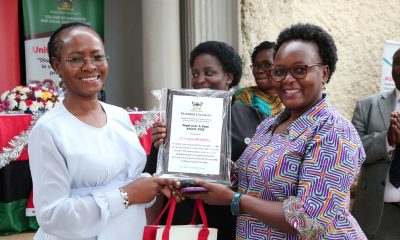

Dr. Pamela Khanakwa Honored for Steering Record 18 PhD Candidates for the Mak 2026 Graduation
-
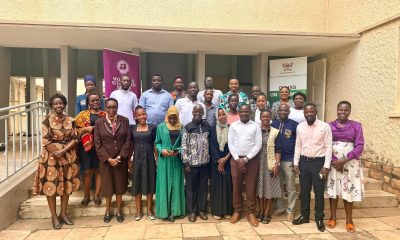

Ugandan Journalists Trained on Peace and Gender-Sensitive Reporting Ahead of 2026 Elections
Humanities & Social Sciences
Meet Najjuka Whitney, The Girl Who Missed Law and Found Her Voice
Published
7 days agoon
February 23, 2026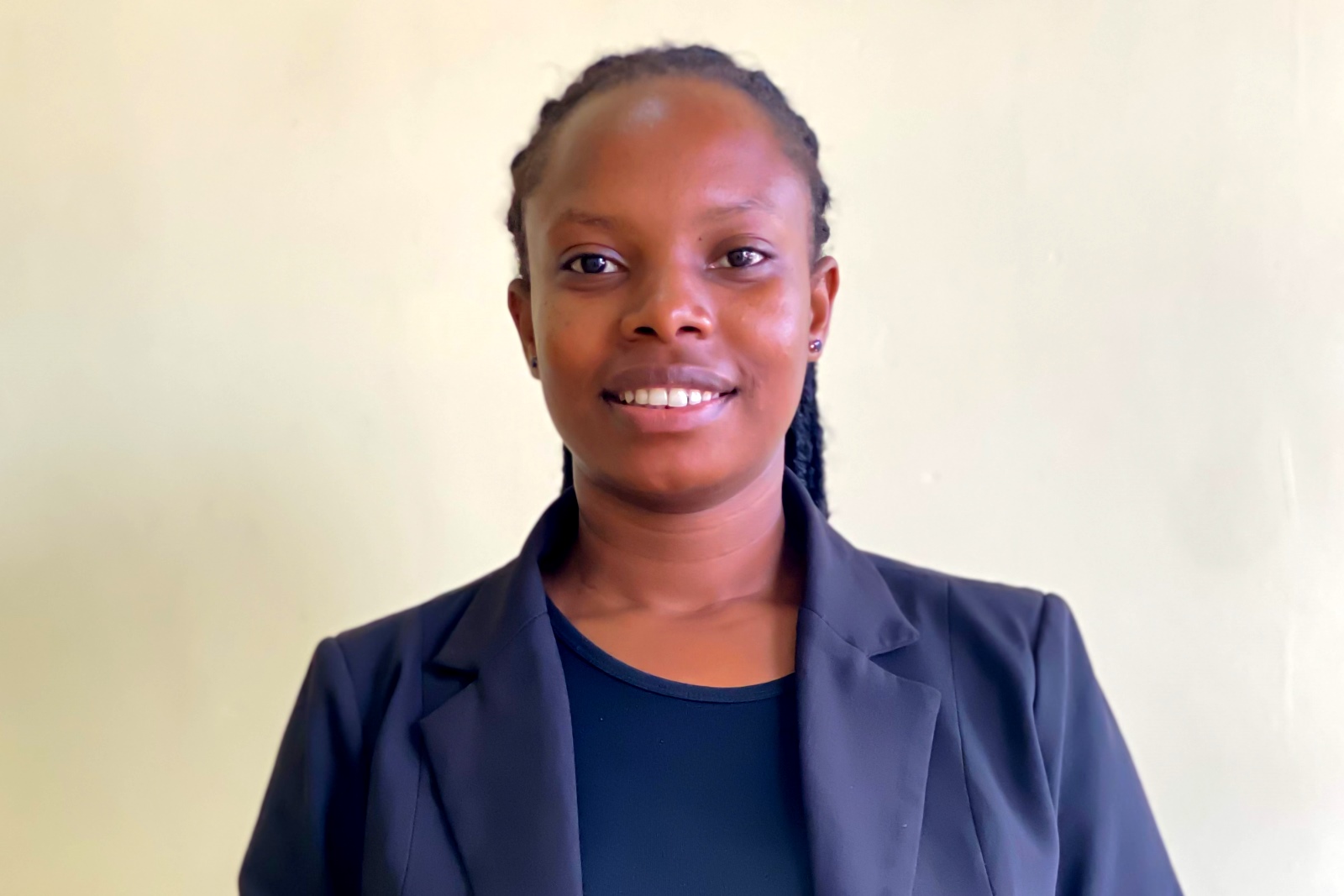
On the morning of Friday, February 27, when the academic procession winds its way across Makerere University’s Freedom Square for the last day of the 76th Graduation Ceremony, Whitney Najjuka will walk into history with a number beside her name: 4.46.
At Makerere, that number means First Class Honours. It means the Vice Chancellor’s List. It means she graduates as the only First-Class student in Journalism and Communication this year. But numbers, as Whitney has learned, rarely tell the full story.
Born on March 27, 2002, in Nabbingo, Kyengera Town Council, to Margaret Kusemererwa and Fred Kasirye, dreamt she would do Law, one of the disciplines, prestigious, almost inevitable next steps for a student who had excelled in secondary school. She had done everything correctly. Studied hard. Scored well. Followed the script.
But Makerere University had other plans. She missed the pre-entry mark, but found her name under Journalism and Communication, another prestigious course offered by the Journalism and Communication Department at Makerere University.
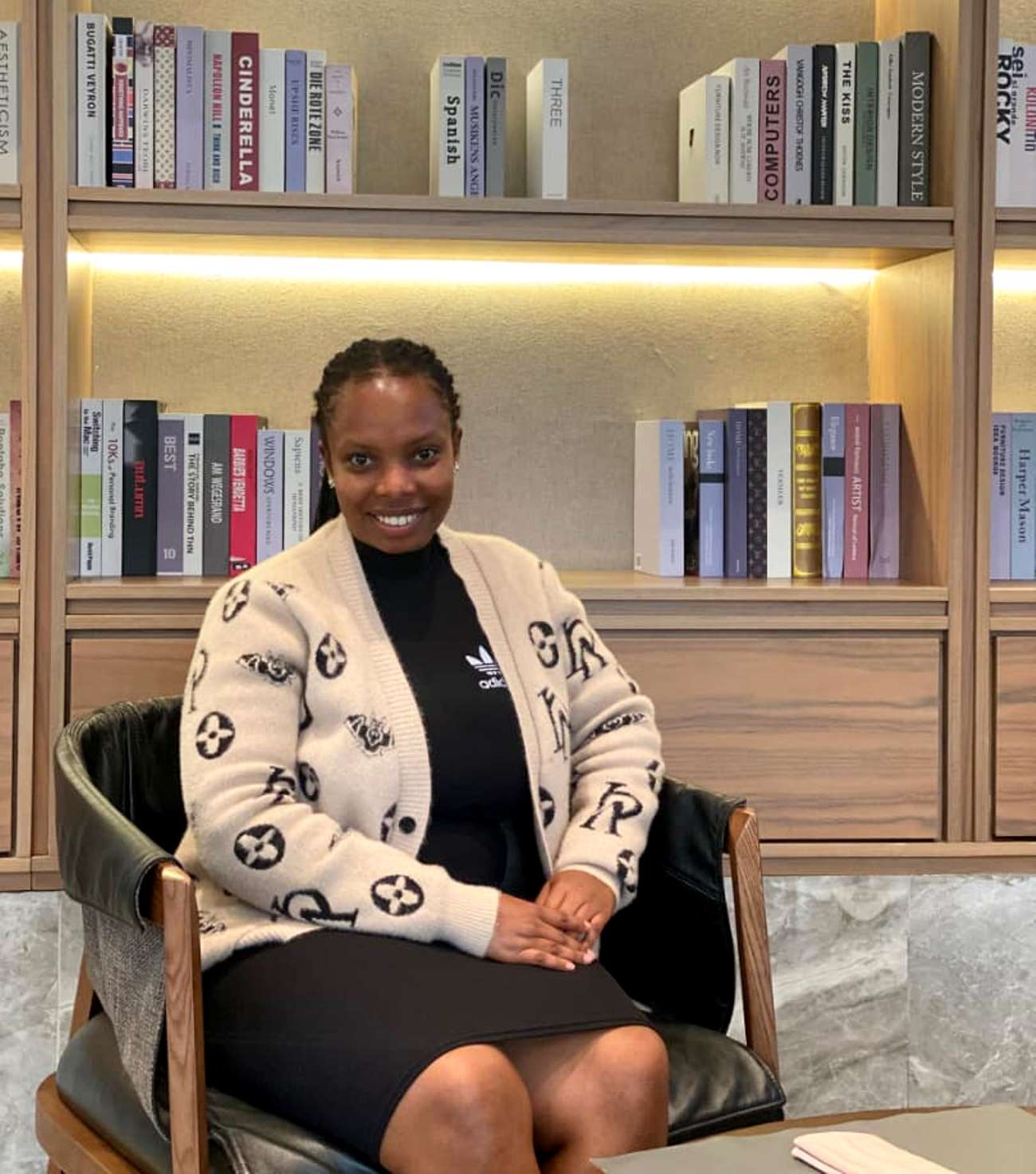
Najjuka began her academic journey at Muto Primary School in Buwama, earning 8 aggregates in the Primary Leaving Examination, a performance that positioned her strongly for secondary school.
She would later join St. Lucia Hill School, Namagoma, where she earned 20 aggregates at O-Level and 17 points in History, Luganda, and Divinity at A-Level.
Missing her dream course, Law, felt at first, like a detour. But Whitney was encouraged by Sanyu Christopher, her uncle, and she settled for a government-sponsored slot in the Bachelor of Journalism and Communication at Makerere, which she had applied for before.
She entered uncertain. But she graduates transformed.
The Pivot That Became a Purpose
Whitney speaks of her early university days with candor. She did not arrive at the Department of Journalism and Communication with a burning childhood ambition to be a journalist, but because another door had closed.
Then, Social and Behavior Change Communication happened. Applied Strategic Communication happened. She began to see media not as headlines and microphones, but as architecture, shaping how societies think, argue, and act.
The turning point came in her third year. The Female Journalist Foundation published her story on Sexual Gender-Based Violence (SGBV) and its emotional toll on survivors. What startled her was not its publication but the reaction. Comments flooded in. Debates ignited, especially about the role of men in combating GBV.
“I realized media doesn’t just report,” she says. “It frames how society views a crisis.”
Her voice, once tentative, had entered a national conversation.
The Discipline Behind 4.46
At Makerere University, a First Class CGPA is not built on brilliance alone but on ritual.
Whitney’s ritual began with showing up, on time, every time. She treated lectures as appointments with her future self. She refused to confine her learning to the syllabus. While attending workshops at the Aga Khan Graduate School of Media and Communication and obtaining external certifications, she sought and was open to mentorship through the Public Relations Association of Uganda (PRAU).
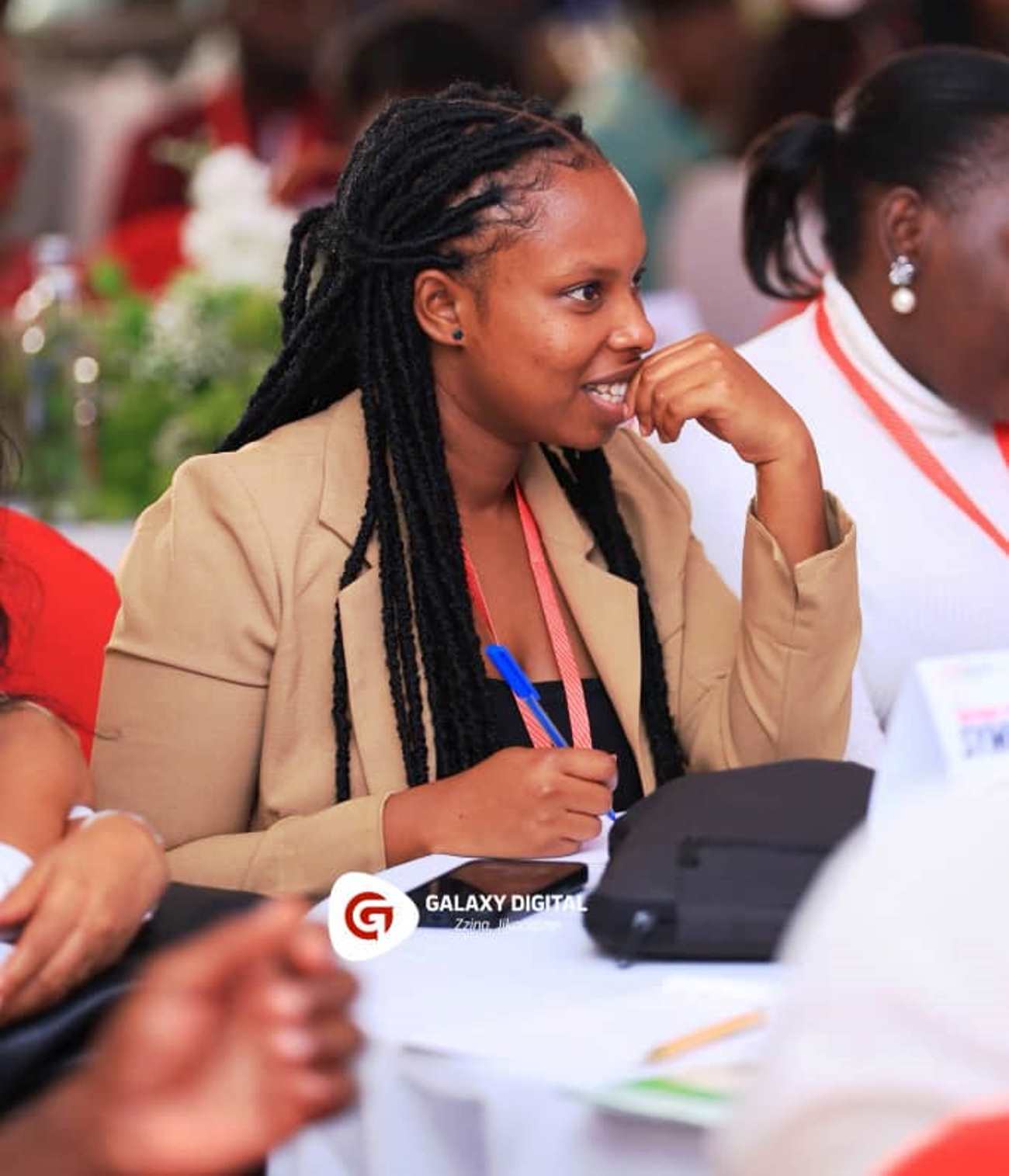
She wanted theory anchored in practice. And then there was the commute.
From Nabbingo, a hill in Wakiso District, some 18.6 km to Kampala, where the Makerere Main campus is situated, and back, nearly 20 hours a week dissolved into Kampala traffic. Two-hour journeys before 8:00 a.m. lectures. Dust. Noise. Headaches. She learned to manage energy the way others manage time. Fatigue became a tutor in resilience.
“I had to be intentional with every remaining hour,” she says. “Excuses were not an option.”
Learning to Practice Communication
If classrooms taught her analysis, presentations taught her courage. Pitching projects, defending research, and standing before peers quick to critique forced her to think on her feet. She was no longer simply studying communication; she was practicing it.
In 2024, the AGMES Fellowship at the Aga Khan Graduate School of Media and Communication pushed her further. She received funding to produce a capstone project on the mental impact of gender-based violence on survivors. She identified sources, conducted interviews, handled trauma with care, and worked with professional editors.
The Communication, she learned, is logistics and ethics as much as eloquence.
The Future She Sees
Whitney is optimistic about Uganda’s media landscape. The digital shift, she believes, has democratized influence. Young communicators are no longer confined to legacy newsrooms or offices.
Yet she sees a gap in the absence of structured research on sustainable, ethical, profitable independent media ventures in Uganda. Her ambition is not only to practice communication, but to study it. To produce data-backed frameworks that help young Ugandans transition from graduates to media entrepreneurs.
She wants to make the impact scalable.
What Remains
As the only First-Class graduate in her cohort, she is careful not to mythologize herself. “Success isn’t brilliance alone,” she says. “It’s a daily commitment when nobody is watching.”
Even before graduation, Whitney had stepped into the industry through a mentorship internship at Capital One Group (COG EA Ltd), a strategic marketing communications agency operating across East Africa.
At Capital One Group, we spoke to Paul Mwirigi Muriungi, the Managing Director and Head of Strategy, who spoke of Najjuka as a progressive and intentional young professional who approaches her work with curiosity, maturity, and responsibility.
“Her attitude is exemplary. She is teachable, receptive to feedback, and eager to grow. While technical skills can be taught, character, work ethic, and mindset determine long-term success, qualities that Whitney consistently demonstrates. Given her academic excellence and professional application, we believe she has a bright future both at Capital One Group and within the wider communications industry. She represents the kind of talent the profession needs: thoughtful, adaptable, and committed to excellence.
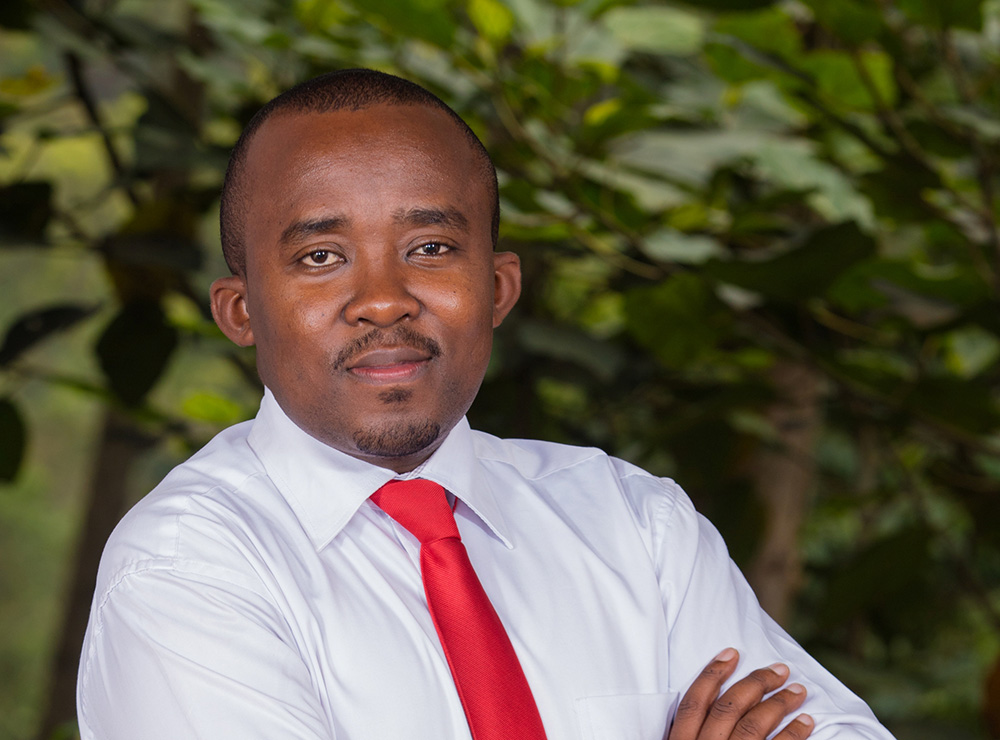
“We look forward to seeing her next chapter unfold,” says Mwirigi.
Najjuka’s gaze extends beyond her own trajectory. She speaks of what the Department could become. Furnished and equipped with industry-standard equipment, newsroom simulations, and deeper investment in data journalism as prayers. Her excellence is not self-congratulatory, but it is forward-looking.
“The University should support the Department to procure industry-standard equipment. Access to high-quality cameras, sound booths, and updated editing software like Adobe Creative Suite is critical to our learning environment,” she says.
Adding that, “We need a newsroom simulation, a physical or digital space where students work under real-time deadlines to produce content for the public. That would prepare us for industry and even strengthen the University’s own media platforms.”
In an era defined by metrics, algorithms, and digital traceability, data journalism is no longer a niche skill but a sine qua non of credible reporting. “There should also be more focus on data journalism and search engine optimization. These are no longer optional skills. Students would benefit immensely from stronger training in these areas.”
Dr. Aisha Nakiwala, the Head, Department of Journalism and Communication, says the faculty are very proud that she is graduating with a First Class—the only one in this year’s cohort.
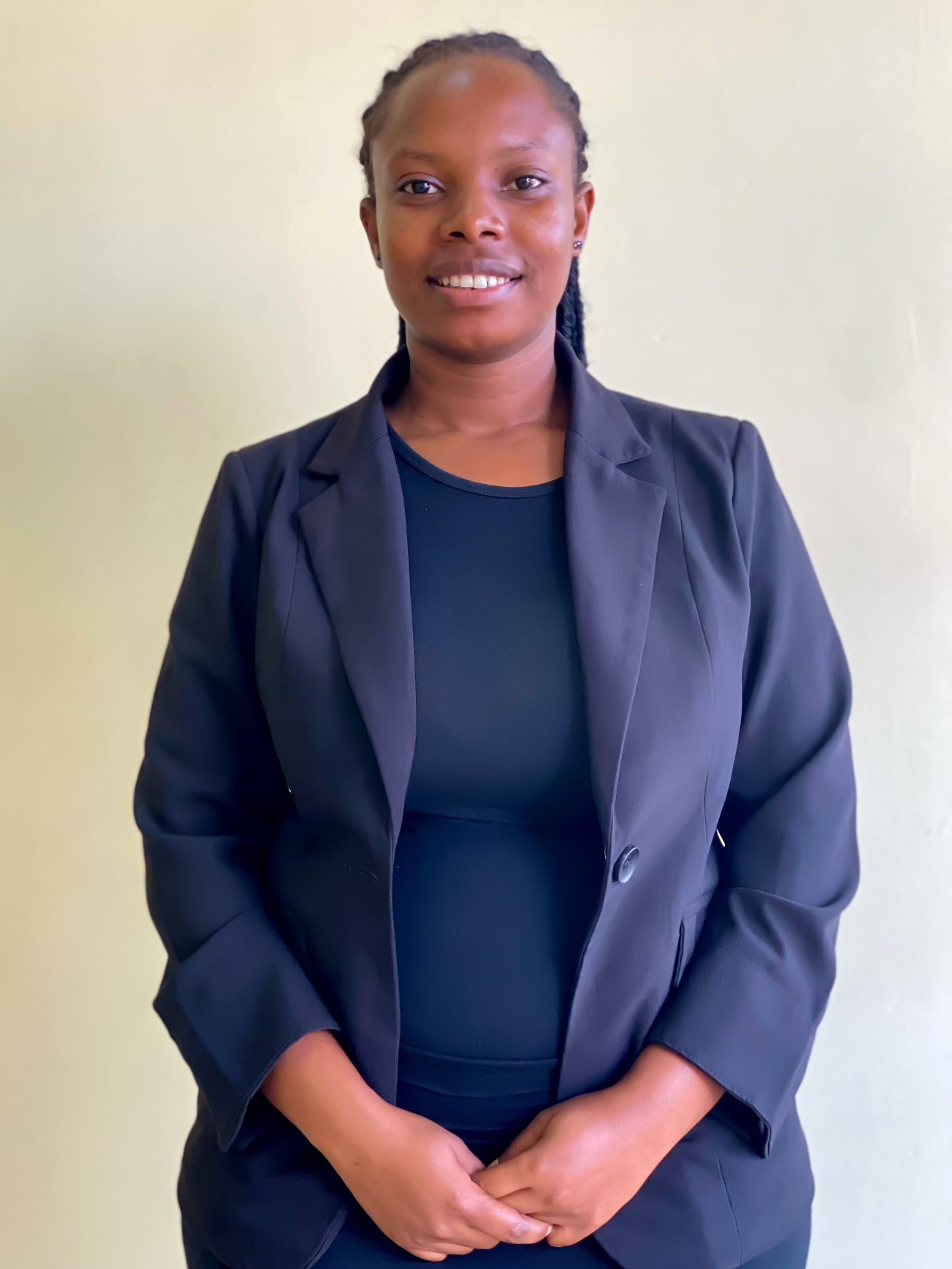
“This achievement reflects not only exceptional intellectual ability but also discipline, resilience, and sustained dedication to the highest standards over four years. Graduating with first-class honors is no small feat; it requires consistent outstanding performance.
“Her accomplishment sets a powerful example for continuing students and reaffirms our department’s commitment to nurturing excellence. We are confident she will make meaningful contributions to the communication profession and society at large,” says Dr. Nakiwala.
On graduation day, applause will crest and recede. The gowns will fold back into wardrobes. The transcripts will be filed away in cabinets. But something quieter will endure; a young woman from Nabbingo who once missed her Law mark, who spent 20 hours a week on the road, who discovered that storytelling is power, and who now walks into Freedom Square not by accident, but by intention.
Life, as she has come to understand it, lives on.
Humanities & Social Sciences
Dr. Pamela Khanakwa Honored for Steering Record 18 PhD Candidates for the Mak 2026 Graduation
Published
1 month agoon
January 23, 2026By
Jane Anyango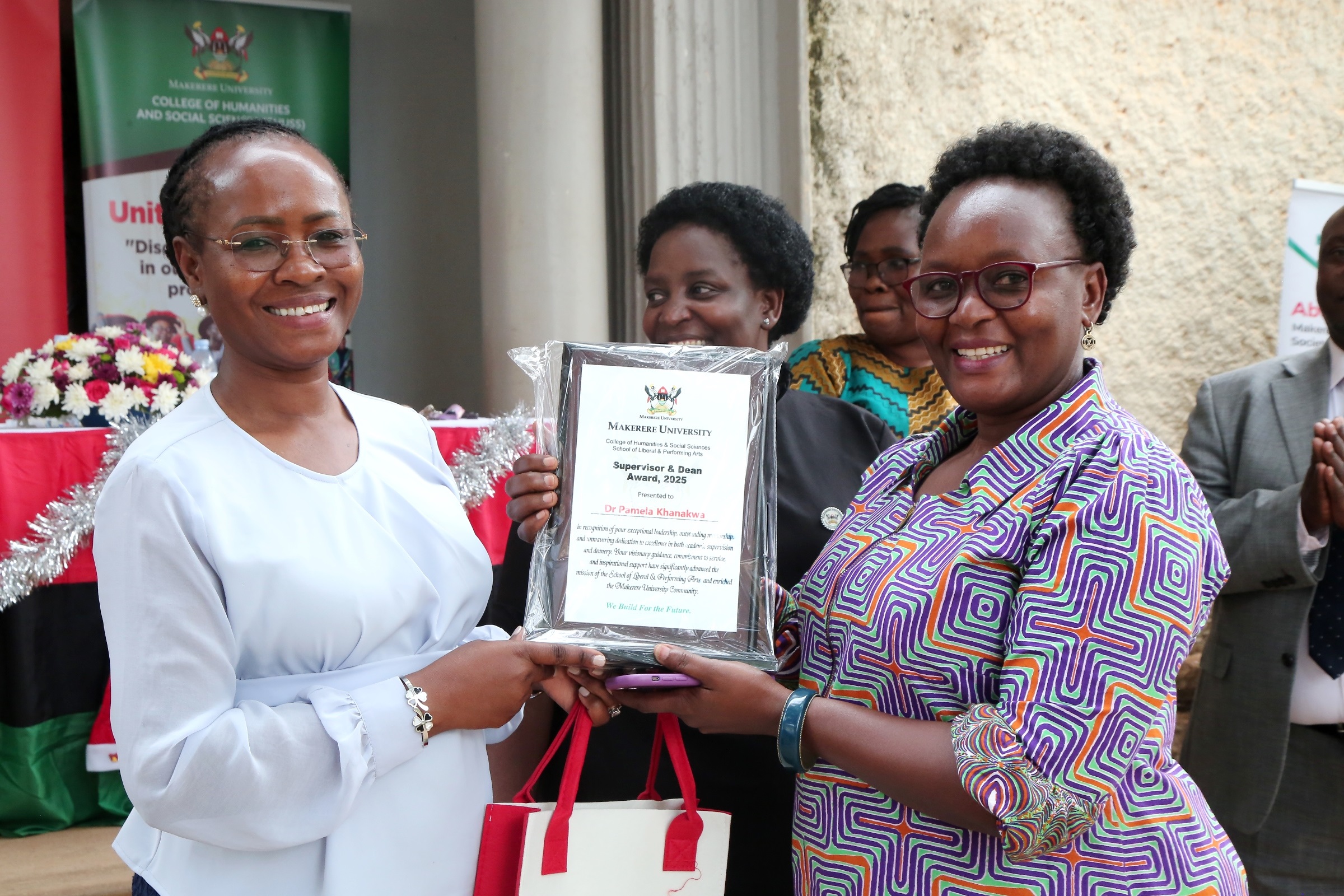
Six personally supervised, three completed in record time, as School of Liberal and Performing Arts sets a historic milestone. Dr. Pamela Khanakwa got the Award as Best PhD Supervisor and Dean
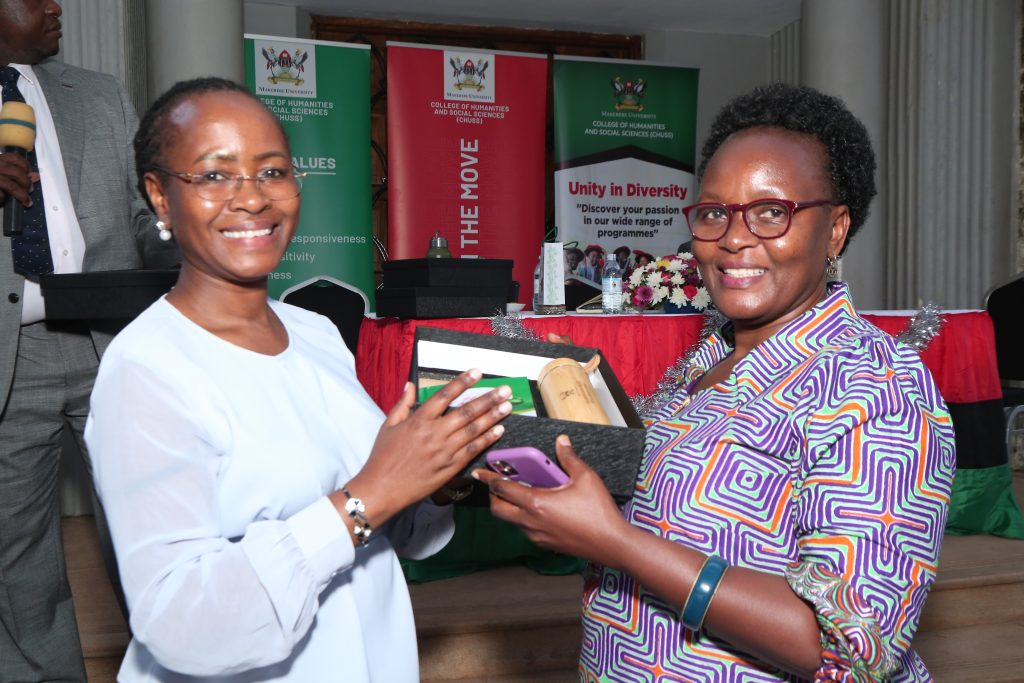
A Historic Academic Milestone for SLPA
The College of Humanities and Social Sciences (CHUSS) recognised the Dean of the School of Liberal and Performing Arts (SLPA), Dr. Pamela Khanakwa, for outstanding academic leadership that has seen the School field 18 PhD candidates for the next 2026 Makerere University Graduation Ceremony scheduled for 24th-27th February. Remarkably, six of these doctoral graduates were directly supervised by Dr. Khanakwa, with three completing within the official three-year timeframe, an exceptional achievement in graduate training. The recognition was announced during the CHUSS End-of-Year Get-Together, where staff applauded Dr. Khanakwa’s dedication, humility, and relentless commitment to postgraduate supervision and timely completion.
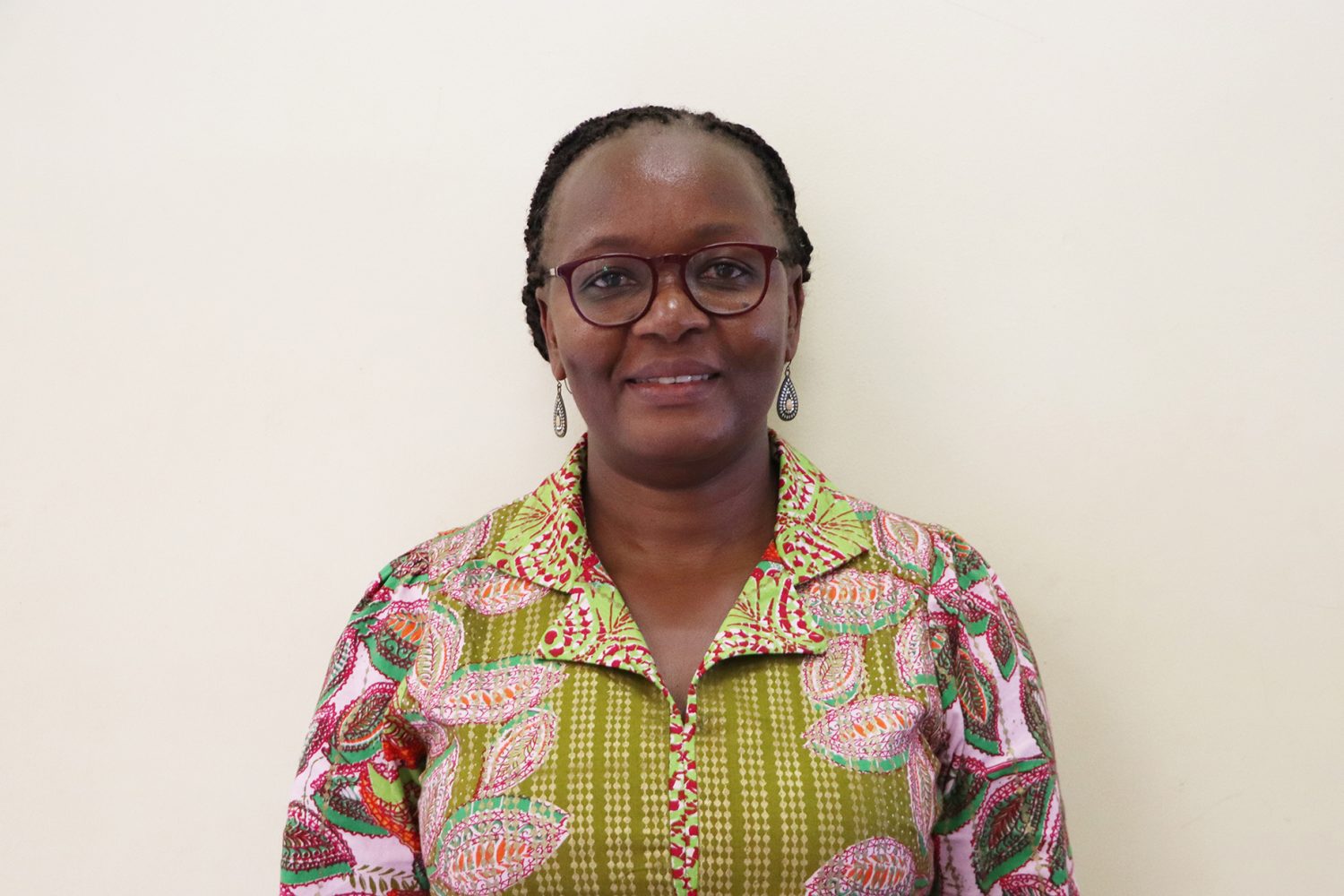
Message to Academic Staff
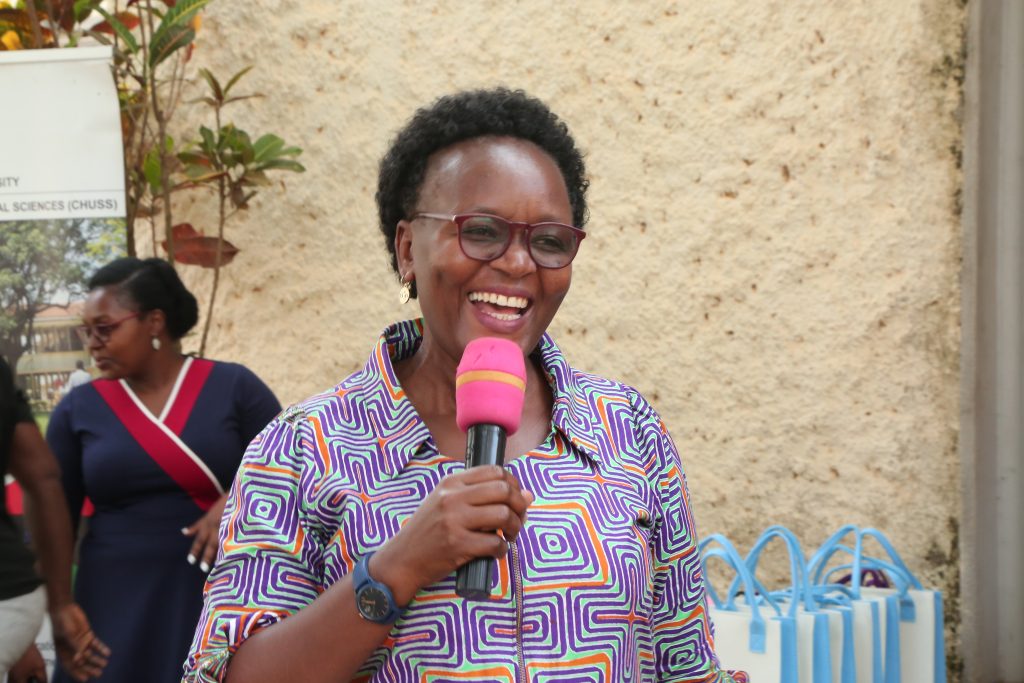
Q: What message do you have for your staff following this achievement?
Dr. Khanakwa:
First, I celebrate my staff and thank them for their dedication to supervision and student support. Academic work is demanding, and material rewards are often limited, but the true satisfaction comes from seeing students succeed.
I encourage my colleagues to remain committed. Yes, the workload is heavy, but many things are possible with dedication and teamwork. Let us continue working for the good of our students, our School, and Makerere University.
Leadership Rooted in Humility
Q: Many colleagues describe you as humble, down to earth, and hardworking. What shapes this character?
Dr. Khanakwa:
I think it is largely my upbringing. My mother was a primary school teacher from the 1950s until the mid-1980s. She worked extremely hard to raise us, combining teaching with farming to ensure we had school fees and basic needs. From her, I learned humility, discipline, and the value of hard work.
I also learned that leadership positions are temporary. You occupy them today, and tomorrow you move on. So humility is essential.
My graduate training also shaped me significantly. My PhD supervisor emphasized that graduate study is a full-time job and that results matter more than noise. Let people see your work through outcomes, not announcements.
Supervision as a Two-Way Commitment
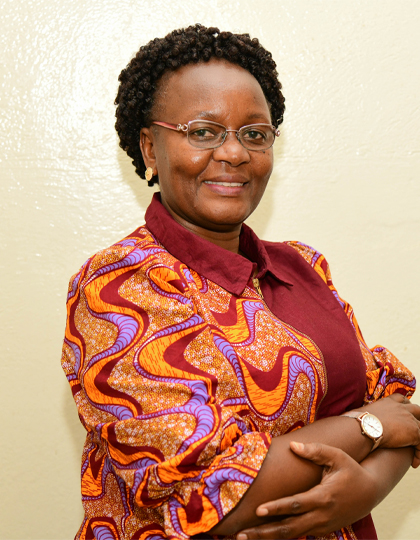
Q: How would you describe your supervision style?
Dr. Khanakwa:
I read my students’ work thoroughly, word by word. Sometimes my comments are tough, but they are honest. Supervision is a two-way commitment. I give feedback, but students must also respond and remain engaged. When that relationship works, progress happens.
Balancing Leadership, Scholarship, and Family
Q: How do you balance being a Dean, scholar, wife, mother, and daughter?
Dr. Khanakwa:
Honestly, I am not sure I balance perfectly. My mother lives far away in Bukwo, so visiting requires careful planning. My children grew up understanding the demands of academic life. I pursued my PhD in the United States and spent long periods away, but we adapted as a family.
Work has become part of my lifestyle. I use weekends to read dissertations, review manuscripts, and write. Sometimes my children ask if I ever sit without working, but this is the commitment I made. As we often say jokingly, “We humbly applied for the job, so let us do the job.”
Scholarship Beyond Supervision
Dr. Khanakwa is also an active scholar and editor. In the past year alone, she has:
- Edited scholarly volumes on archives, memory, method, and pedagogy
- Published a book with Routledge Companion
- Co-authored journal articles and book chapters with graduating students, including Priscah Asiimwe and Anatoli Lwasa Mpijja
“I feel an obligation to write with students,” she notes. “It takes time, energy, and commitment, but it is part of academic mentorship.”
Who Is Dr. Pamela Khanakwa?
Dr. Pamela Khanakwa is the Dean, School of Liberal and Performing Arts, College of Humanities and Social Sciences, Makerere University. She is a seasoned scholar, supervisor, administrator, and mentor whose leadership continues to redefine graduate training excellence. Details about Dr. Pamela Khanakwa can be accessed at: https://chuss.mak.ac.ug/en/personnel/pamela-khanakwa/
More details are available in her attached curriculum vitae.
The CHUSS End- Of-Year-Get-Together
On 12th December, 2025 the college leadership organised a get-together end of year gathering to take stock of the achievements, challenges and brainstorm together on how to move forward. The event was marked by entertainment, team building games, appreciation speeches, sharing a meal and a Christmas package for every staff
Retirees and staff recognised
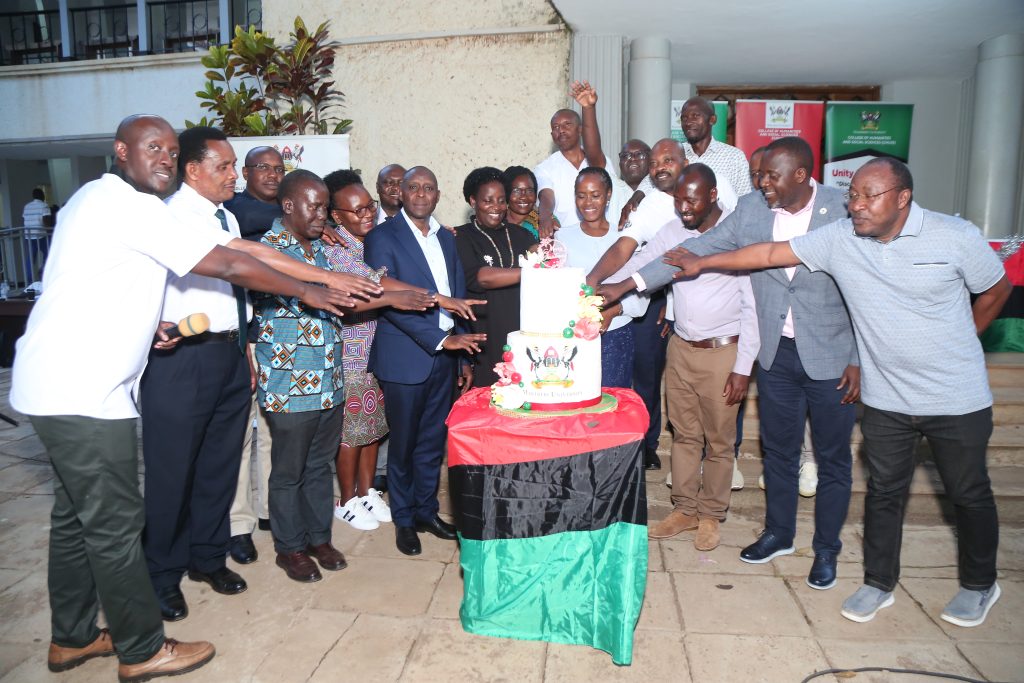
Five retired staff Dr. Micheal Wangotta Masakala, Dr. Anatole Kirigwajjo and Dr. Jackson Kizza Mukas (all from the School of Languages, Literature and Communication), Assoc. Prof. Florence Nansubuga (School of Psychology), Dr. Tusabe Gervase (School of Liberal and Perforing Arts) and Ms. Scovia Nganda Sekweyama (secretary from the School of Social Sciences) were recognised for their dedicated services to the university.
In addition to Dr. Pamela Khanakwa’s Award as Best PhD Supervisor and Dean, Ms. Birabwa Florence scooped the award of Best Registrar of the year. Birabwa is the registrar for the School of Liberal and Performing Arts.
Administrative and support staff including Ms. Mary Gyezaho and Annet Kashumbusha(both administrative secretaries in the Principals office), Farouq Lule (IT Officer), Godfrey Kakooza (cleaner), Charles Sebuguzi (driver) and Jane Anyango (Communications officer) were recognise with awards for outstanding service. Dr. Mohamed Mayanja Kajumba was from the School of Pyschology was recognised as the person with an outstanding talent in Handwriting.
The celebrations held in the Arts quadrangle were graced by the Vice Chancellor Academic Affairs Prof. Sarah Ssali and the Deputy Vice Chancellor in charge of Finance and Adminstration Prof. Ireeta Tumps.
Humanities & Social Sciences
Ugandan Journalists Trained on Peace and Gender-Sensitive Reporting Ahead of 2026 Elections
Published
2 months agoon
January 9, 2026By
Jane Anyango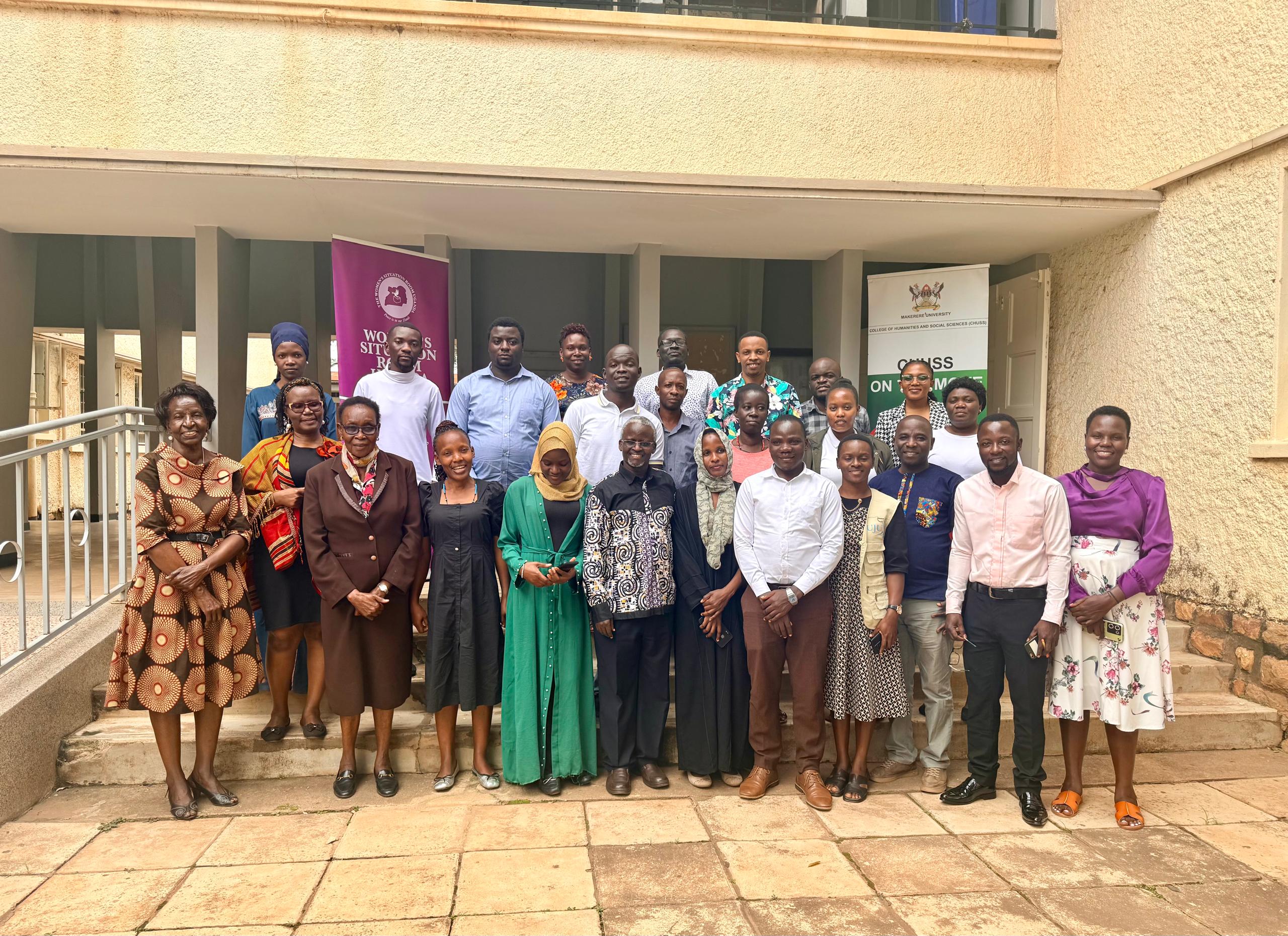
Kampala, Uganda – January 9, 2026
Ahead of the January 15 general elections, Ugandan journalists have undergone specialized training on peace and gender-sensitive reporting to ensure responsible media coverage during the election period. The two-day training, held from 8th to 9th January 2026 at Makerere University’s College of Humanities and Social Sciences Smart Room, was organized by the Women’s Situation Room (WSR) in partnership with various stakeholders and brought together journalists from across print, broadcast, and online platforms.
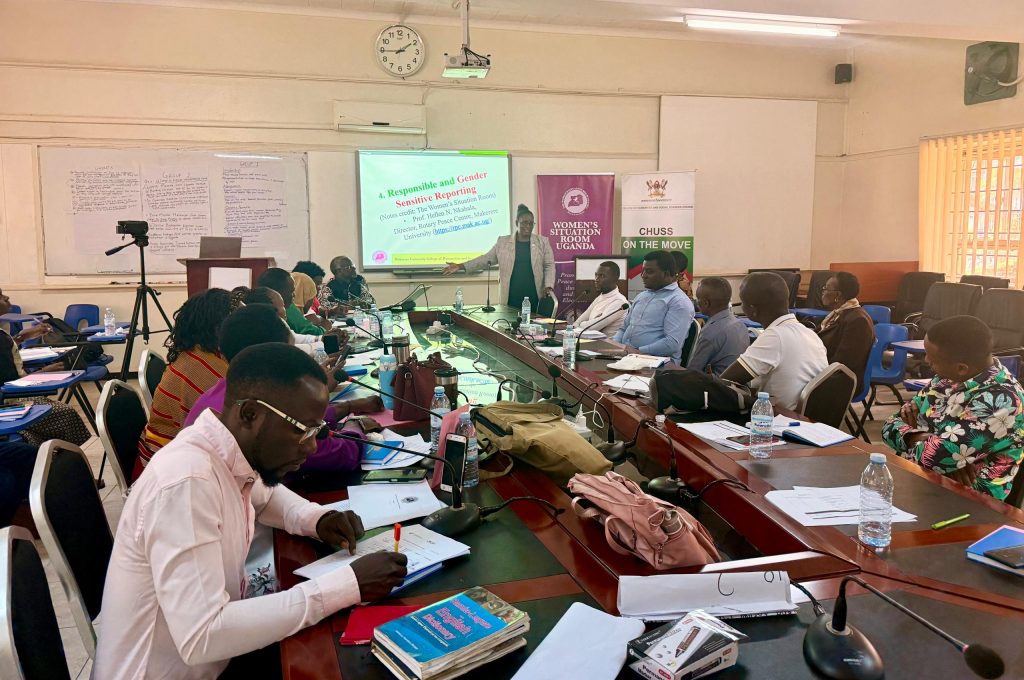
The main objective of the training was to strengthen the capacities of media in reporting and documenting electoral processes in a responsible and gender-sensitive manner. The specific objectives included: strengthening journalists’ skills to cover the 2026 elections in a fair, balanced, gender-sensitive, and non-violent partisan way; enhancing the role of media to enable citizens to be well-informed and actively participate in the election process; ensuring focused and balanced reporting on peace during and after elections; and strengthening partnerships between the WSR and media houses during the election period.
The training covered multiple critical modules. Day one focused on responsible conflict-sensitive reporting, emphasizing principles such as balance, impartiality, and accuracy. Participants explored the role of media as a relayer of the population’s voice, election monitor, catalyst for social cohesion and reconciliation, contributor to the accountability of political actors, and a platform for detecting and debunking digital media misinformation and hate speech.
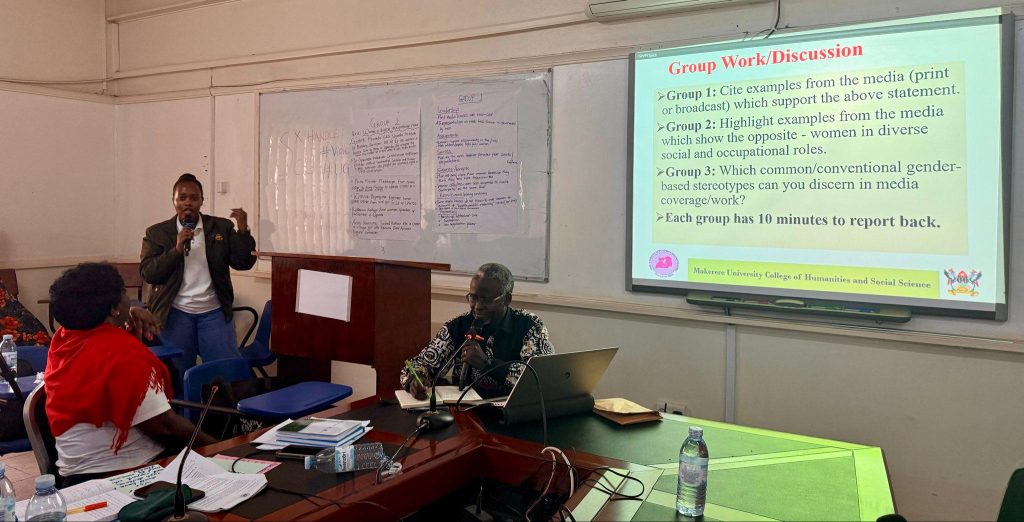
Day two addressed responsible and gender-sensitive reporting. Key aspects included the definition of gender-sensitive reporting, how to become a gender-sensitive reporter, critical elements in reporting with gender awareness, packaging gender-sensitive stories, and a checklist for detecting and avoiding gender-insensitive reporting.
Her Lordship, retired Judge Justice Mary Mayitum, emphasized the importance of peace as the foundation of development and democratic engagement. “Because we value peace more than anything. Without peace, really, you can do nothing. But where there is peace, you can have time to reflect, discuss with others, and join in meaningful dialogue,” she said. She warned that the country’s past conflicts, such as those in Gulu, underscored the necessity of maintaining national harmony.
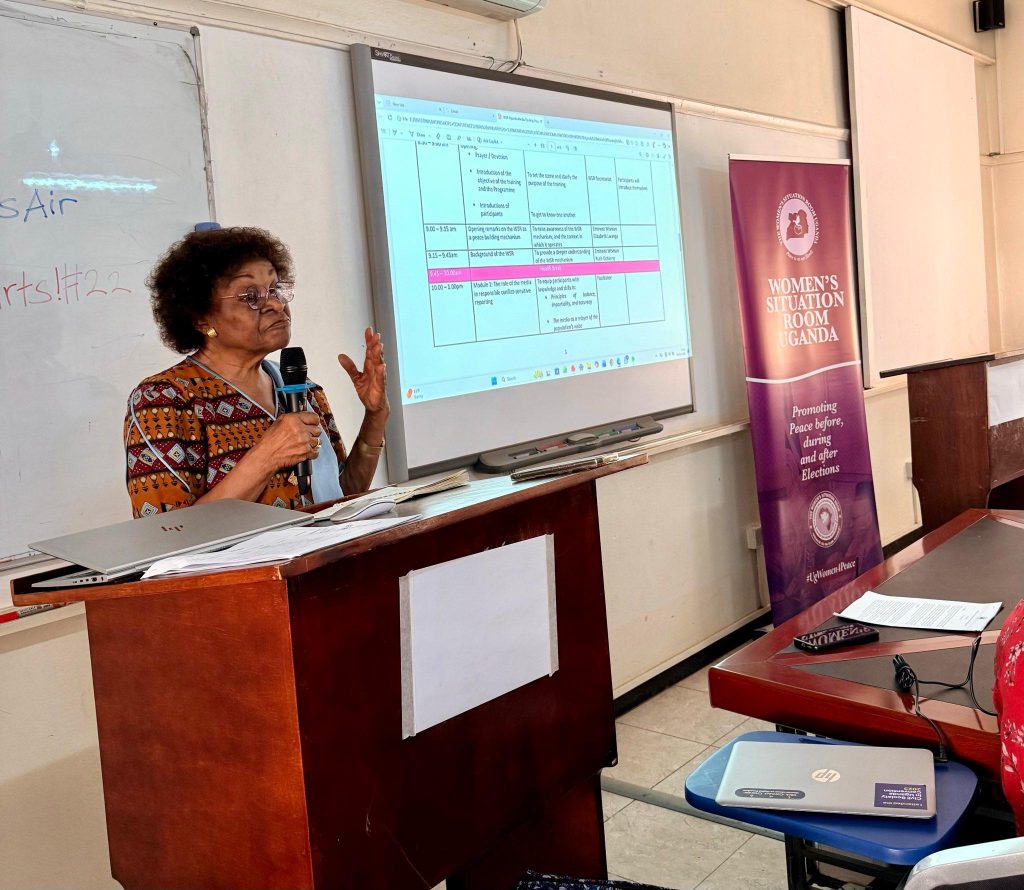
Justice Mayitum also urged other key election stakeholders to uphold peaceful conduct. “Being peaceful is the very heart of life. We have spoken to police, security personnel, political parties, and the Electoral Commission. We want politicians to have a code of conduct and to understand that it’s okay to think differently without fighting or hating one another,” she added.
Dr. William Tayebwa, lead facilitator and senior lecturer in the Department of Journalism and Communication at Makerere University, said, “This training is about conflict-sensitive reporting, peace journalism, and gender-sensitive reporting in the context of the elections. The emphasis was on giving female political candidates a voice while ensuring journalists report responsibly on election-related matters.”
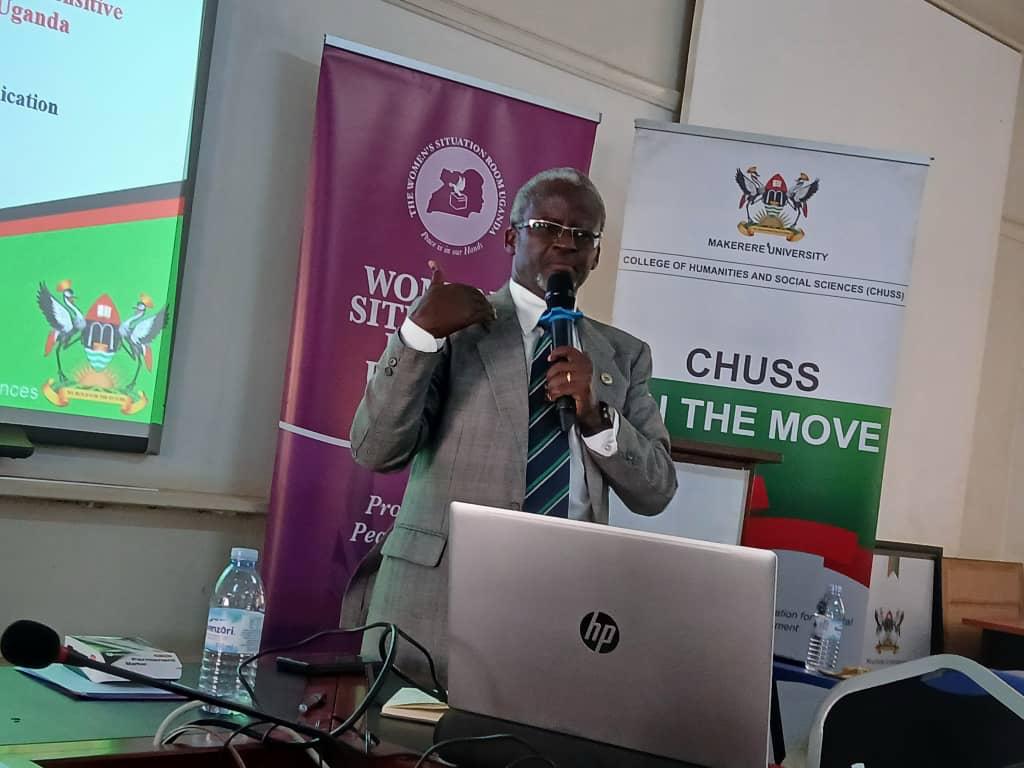
Participants described the training as timely and impactful. Tony Banizengabo of CBS Wakiso District said, “We’ve benefited a lot. We’ve been trained to write stories which bring peace, not conflict. Ahead of the elections, we are very ready to be part of peacemakers.”
Dorcas Kimono of UBC TV Kampala added, “It was so timely and rich. We learned how to report without promoting or fueling violence, giving voice to victims without angering them or encouraging violators. This is very vital, especially as we approach the 2026 elections.”
The training aims to equip media personnel with the knowledge and skills to uphold professional ethics while contributing to a peaceful, inclusive, and gender-sensitive electoral process.
Trending
-

 Humanities & Social Sciences7 days ago
Humanities & Social Sciences7 days agoMeet Najjuka Whitney, The Girl Who Missed Law and Found Her Voice
-

 General6 days ago
General6 days ago76th Graduation Highlights
-

 Health2 weeks ago
Health2 weeks agoUganda has until 2030 to end Open Defecation as Ntaro’s PhD Examines Kabale’s Progress
-

 Agriculture & Environment1 week ago
Agriculture & Environment1 week agoUganda Martyrs Namugongo Students Turn Organic Waste into Soap in an Innovative School Project on Sustainable Waste Management
-

 General2 weeks ago
General2 weeks agoMastercard Foundation Scholars embrace and honour their rich cultural diversity
